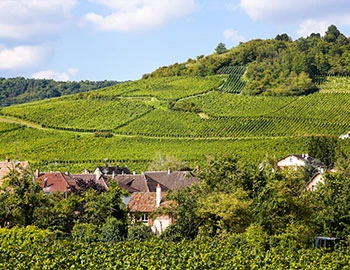Châteauneuf-du-Pape Clos des Papes blanc 2023
Châteauneuf-du-Pape Clos des Papes blanc 2023
AC Châteauneuf-du-Pape, Paul Avril, 750 ml

Description
Robert Parker, The Wine Advocate (Joe Czerwinski) writes about this wine: "Produced from roughly equal proportions of six varieties, co- fermented in stages, as each one is deemed ripe and picked, the 2022 Chateauneuf du Pape Blanc is atypically plush and ripe (it's close to 15% alcohol), marked by pineapple, white peach and tangerine notes. It's full-bodied and round, deceptively easy to drink yet concentrated and long on the finish. I suspect it may age longer than my projected range, but there's no compelling reason to wait on this vintage."
Attributes
| Grape variety: | Roussanne, Grenache gris, Clairette blanche, Bourboulenc |
| Producer: | Clos des Papes |
| Origin: | France / Rhône / Châteauneuf-du-Pape |
| Ripening potential: | 2 to 10 years |
| Drinking temperature: | 10 to 12 °C |
| Food Pairing: | Crispy roast chicken, Roast veal with morel sauce, Whole baked fish, Succulent chicken breast with cream sauc |
| Vinification: | fermentation in steel tank |
| Harvest: | hand-picking, strict selection |
| Maturation: | in large wooden barrel/foudre, long cultivation |
| Volume: | 14.0 % |
| Note: | Contains sulphites |
Clairette blanche
A hint of smoke
Lively citrus aromas and a touch of smoke are the hallmarks of the southern French Bourboulenc. It is also known as Clairette blanche or Malvoisie. This white wine grape is almost never produced solo. Instead, it lends its freshness to the white Châteauneuf-du-Pape and many other assemblages in southern France. Its origins lie in the Vaucluse Plateau in Provence. It turns out particularly delightfully in the massif of La Clapa in Languedoc, directly on the Mediterranean. There, the wines from Malvoisie acquire a salty-iodine note.
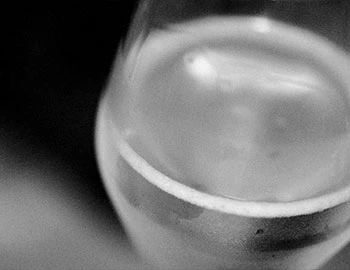
Roussanne
The vivacious redhead
“Roux” is French for “rust-red” or “red-haired”, just the way the ripe berries of Roussanne gleam. The grape thrives in the northern Rhône Valley, where it shapes, among others, the white wines of Hermitage, Crozes-Hermitage and Saint-Joseph. Further south, it contributes its lively acidity and aromatic bouquet of apricot, herbs and flowers to white Châteauneuf-du-Pape and Côtes du Rhône. It is almost inextricably linked with its close relative the Marsanne, with which it is nearly always blended. As early as 1781 they were both mentioned together in a text about the Hermitage region. For the last few years, they have even celebrated successes in California. A group of vintners there, nicknamed the “Rhône Rangers” – an allusion to the hero from Westerns – cultivates typical Rhone varieties.
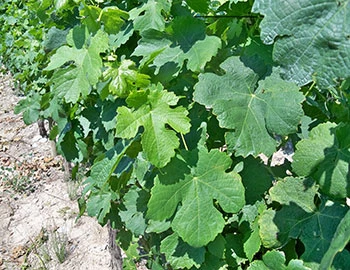
Bourboulenc
A hint of smoke
Lively citrus aromas and a touch of smoke are the hallmarks of the southern French Bourboulenc. It is also known as Clairette blanche or Malvoisie. This white wine grape is almost never produced solo. Instead, it lends its freshness to the white Châteauneuf-du-Pape and many other assemblages in southern France. Its origins lie in the Vaucluse Plateau in Provence. It turns out particularly delightfully in the massif of La Clapa in Languedoc, directly on the Mediterranean. There, the wines from Malvoisie acquire a salty-iodine note.
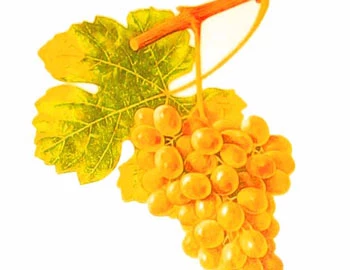
Grenache gris
No grey mouse
Alongside the red and white Grenache , the Grenache gris is the third variant of this grape. Its relevance is limited. It does not grow in noteworthy quantities outside the south of France. But where it is found – as in white Châteauneuf-du-Pape or the port-like elixirs of Banyuls and Maury – it contributes its round, full-bodied texture, its elegant structure, mineral notes and a hint of anise. Its name can be misleading: the berries are not always grey, but often shimmer pink when ripe.
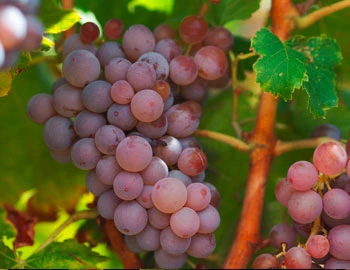
Rhône
Rhône: northern power, southern charm
The Rhône’s source is in Valais, and it flows into the Mediterranean 800 kilometres to the south. In the last 200 kilometres of its course, it is lined with vines which yield a range of red crus that are among the most prestigious wines in the world – for example, on the spectacular cliffs of the Hermitage Mountains, or in the gravelly terraces of Châteauneuf-du-Pape. The river valley, however, is also a rich source of characterful white wines and affordable, high-quality, everyday red wines.
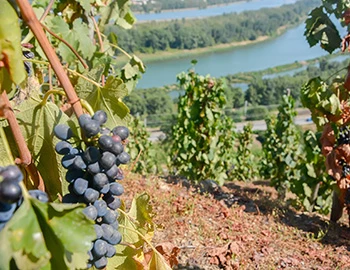
France
France – Philosophy in a bottle
According to French philosophy, wine should be an expression of the soil and climate. They use the word “terroir” to describe this. Terroir makes every wine different, and many especially good. French wine is regarded worldwide as an expression of cultural perfection. The French believe that humans are responsible for the quality of the berries, the vine variety for their character, and nature for the quantity. This philosophy can be expressed succinctly as: “the truth is the vineyard, not the man.”
